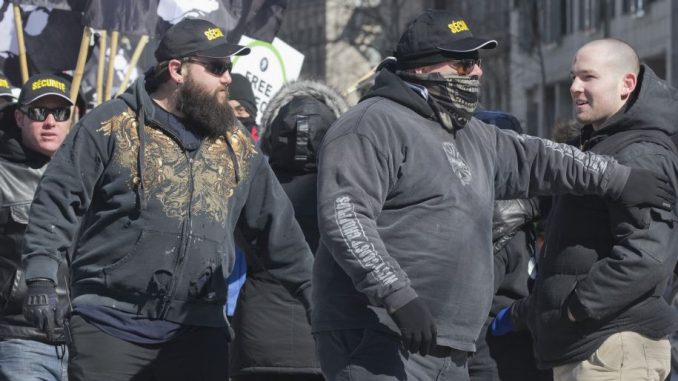
Rise of Islamophobia and right-wing reaction poses new challenges to the left.
On Saturday March 4 in Montreal, the newly created Canadian Council of Concerned Citizens gathered in the bitter cold to protest a proposed federal measure (M103) that condemns Islamophobia. They were met by a counter protest consisting of left groups, including Socialist Alternative, the ‘Resist Trump’ network and the ‘Parti Révolutionnaire Communiste’. Though press accounts estimated a total of 400 people, divided equally over both camps, the counter-protest appeared larger by 50 to 100 people.
Though there was no physical evidence of the CCCC itself, its composition could be inferred by the large number of flags from the far right ‘La Meute’ (Wolfpack) and Pégida-Québec, a local branch of the anti-immigrant German group. Protesters and counter-protesters were quickly separated by the huge police force. The counter demonstrators chanted “Bienvenue aux immigrants” (Welcome immigrants), “Tout le monde déteste les fascistes” (Everybody hates fascists), and The Spanish Civil War slogan “No pasarán”.
After a 2-hour face-off, the right forces took off on a march, with a subset of the left forces marching separately. The protest, one of many scheduled the same day throughout Canada and Quebec, marks a come-back for the far-right, which had been widely discredited after the killing of 6 Muslim men in a mosque in Quebec City just 6 weeks ago. At that time, a spokesman for La Meute denounced the killings, a position consistent with its claims against racist hate speech. But the rhetoric of its website- a toxic brew of Islamophobia, nostalgia and right-wing populism – is a page from the playbook of France’s National Front, which La Meute openly admires. Like the NF’s leader, Marine Le Pen, La Meute seeks to appear reasonable and conciliatory by way of obtaining a wider hearing. But La Meute’s dissociation from the Quebec City massacre has to be seen in the context of its overall rhetoric, as well as growing Islamophobic feeling throughout Quebec and the rest of Canada, as attested to by the thousands of hate mails and death threats received by Iqra Khalid, the Member of Parliament from Mississauga, Ontario, who initiated motion 103.
Unfortunately, an article about the protest in the mainstream online newspaper Lapresse.ca seems all too willing to take La Meute’s pacifist claims about itself at face value, describing their presence at the protest as “calm” and praising their “non-racist discourse during the entire gathering”. On the other hand, the article criticizes anti-fascist forces for “chanting numerous slogans accusing the other side of being ‘fascist’ and “racist’”. A group that conflates Muslims with Islamists, and regards the presence of Muslims in Quebec as a threat is racist, and left-wing protesters are right to say so. At the same time, it is important that the left doesn’t limit itself to accusatory labels, but offers clear responses to tackle the conditions that lead to these groups gaining an audience.
In the present climate, a Quebec province-wide measure like M103, though not an end in itself, is important, to condemn Islamophobia and isolate the far right. But instead, just weeks after the horror in Quebec City, the governing Liberal Party revived Bill 62, a measure to achieve “neutrality” of church and state, and forbid the wearing of clothing that covers the face by judges, police and prison guards. The bill in its earliest version was strongly influenced by the Bouchard-Taylor Report on Cultural and Religious Accommodation of 2008, which called for measures against the wearing of “religious symbols” by “authority figures”. But after the killings in Quebec City, even one of the two authors, Charles Taylor, a prominent Quebec academic and philosopher, revealed in an interview with Radio Canada that he no longer supports his original position against the wearing of religious symbols because it stigmatizes” Muslims.
Despite the clear political opening offered by Taylor, all three opposition parties, the Parti Québecois, Coalition Avenir Québec and Québec Solidaire, collectively proposed an amendment to bill 62 that retains the original framework of Bouchard Taylor, including its clothing ban, a move that was loudly denounced by Liberal Premier Philippe Couillard as inflammatory. But Couillard’s own commitment to religious “neutrality” was quickly exposed when a foot-high crucifix was removed from a Quebec City hospital in response to a complaint. In the face of loud right-wing and Catholic church pressure, Couillard capitulated, asserting that “we can’t turn our back on our history” and allowing the return of the crucifix to its original location in a public institution.
In addition to sending dithering, mixed messages, the mainstream parties, as well as the union leaderships, have effectively delegated the job of fighting the far right to independent left forces. At the same time, the fact that the Quebec and Canadian far right are coming together under the umbrella of the CCCC is evidence of its growing strength. In order to meet these challenges, the left will need to come up with points that can unite and widen the forces fighting the far right, and build a mass party of struggle to truly represent working class communities as an alternative to the threatening forces of racist reaction. Whether this can be achieved is a key question for the left, in Quebec as in the rest of Canada.

Be the first to comment